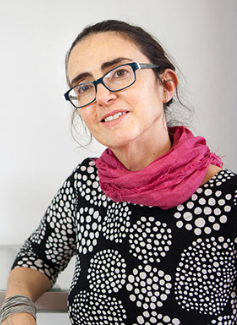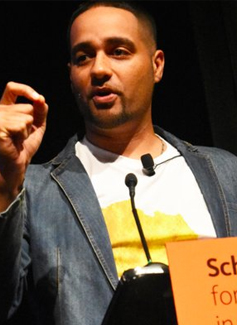In support of middle and high school teachers and students while school buildings are closed, the Zinn Education Project will host online mini-classes with people’s historians.
We held our initial sessions on March 27 and April 3 with historian and author Jeanne Theoharis and high school teacher/Rethinking Schools editor Jesse Hagopian. The theme was “The Rebellious Life of Mrs. Rosa Parks,” based on Theoharis’s book of the same title.
 |
 |
Teachers, parents, and students participated via Zoom for each of the 60 to 75-minute sessions — about 75 for the first session and 85 for the second. We began with a presentation by Theoharis, responding to questions from Hagopian about why it is important to learn this history, Parks’s activism before the Montgomery Bus Boycott, and her decades challenging racism in the North after the Boycott.
Midway through the sessions, we had participants get into small groups via Zoom breakout rooms for about 10 minutes to discuss insights and post questions. The breakout groups with teachers launched into conversations about how to bring this history to the classroom. One teacher added, “I didn’t know you could create small groups with Zoom, this will help me with my online teaching.” Another added, “Everything worked very well. First time I have been put in a small group as part of a Zoom online conference call and it worked perfectly. Beats just sitting and listening for an hour.”
Participants were enthusiastic about the chance to connect and learn in this time of social isolation. Here are a few comments from the closing evaluation about what they learned:
March 27
I loved the push to think about a whole life of activism and not just a moment. Such a powerful reminder that you never know what moment is going to flash to be “the moment.”
I found the reminder that we never know which of our multiple acts of activism or resistance will be the springboard to change very powerful.
I learned that Rosa Parks’s work intersected a lot of issues (racism/segregation, criminal justice, sexual assault, etc.) and spanned both the South and the North. I will use stories and testimonies from Rosa Parks directly to teach high school students about the complex history of the Civil Rights Movement.
Rosa’s extensive history with working on criminal justice and sexual assault cases both before and after her action. I want to apply this to my conversation with folks who are still under the impression that Rosa’s action [on the bus] was the only social justice and civil rights initiative she took.
I learned that Rosa Parks was one person in a long line of people who were protesting the segregated bus system. You don’t know when history is going to grab you and where the turning point will be. I’m not going to underestimate my ability to protest, not going to discount my actions and attempts to make a difference.
I knew about Ms. Parks’ lifelong activism, but learned about the Highlander Folk School for the first time. This past hour has inspired me to learn more about the whole lives of people whose activism I admire.
I learned that I need to finish Professor Theoharis’ book!
April 3
The importance of dissent even when it seems hopeless. I plan to continue to advocate for teaching the 1619 Project and centralizing other stories of marginalization at my daughters’ school.
Her teaching people to disrupt the status quo, which can be carried into today by getting everyone involved in global movements, like the Environmental Justice and Climate Change movements.
The most important story I learned today was the magnitude and length of the Montgomery Bus Boycott. It was deeply inspiring to learn that so much of the effort was coming from black women because I was always taught about the Civil Rights Movement from a male lens. I plan on taking this into my AP Government class and my work with Teens Take Charge.
I did not know about the later years of Rosa Park’s life and her work with the Black Power Movement in Detroit and beyond. I love that she was “everywhere.”
The session reinforced how hungry students are for the complete and unvarnished history — I interacted with amazing students in the break out room.
Rosa’s persistence and solidarity with many movements that showed her active energy and strength rather than passive acceptance.
“You can be shy and fierce” Movements require organizing. Activists need other activists to be around. Women have been the mobilizing force of political and social movements leading to transformation. We have to keep opening spaces in educational context to tell the untold histories and stories. Heroes are human.
I thought the connection to intersectionality and sexism that affected the ways that Rosa Parks was portrayed in history was very important. I also loved the last messages that Professor Theoharis shared about the importance of acting again and again and again as opposed to just focusing on one moment in history.
One participant added to her evaluation, “Thank you for getting us together and giving me hope that we are not alone, and that we can think and act ourselves out of this pandemic.”
Here are recordings of the presentation portions of the two sessions.
March 27
April 3
We will host more sessions in the weeks and months ahead. Complete the interest form if you would like to be notified of upcoming sessions and to share your ideas for speakers and topics.
Questions? Write to zep@zinnedproject.org







Twitter
Google plus
LinkedIn